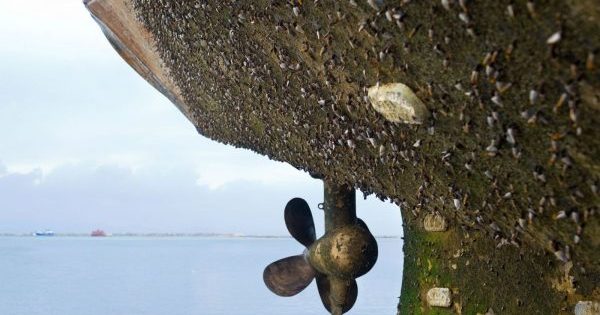Paul Hallett, manager of the Biosecurity and Environment Group at MPI, New Zealand, noted that biofouling maintenance is so important for biosecurity as it is for vessel safety. Highlighting current challenges of biofouling in an interview with GREEN4SEA, he emphasized on Craft Risk Management Standard for Biofouling (CRMS), the world’s first such standard at a national scale, entering into force in May 2018.
GREEN4SEA: What are currently the biggest challenges with respect to biofouling?
Paul Hallet: Managing biofouling is a challenging task for a number of reasons. Despite the fact that up to 80% of non-indigenous marine species are transported via biofouling, there are few regulations in place to manage the biosecurity risk. This means there is little incentive or regulatory drivers to ensure that vessel operators manage biofouling on their hulls. Another challenge is that the logistics of properly maintaining and inspecting for biofouling are difficult, both for vessel operators and biosecurity inspectors. This is because the majority of biofouling is found in niche areas not accessible from the waterline. The Craft Risk Management Standard (CRMS) aims to address these challenges by requiring vessels to manage biofouling using best practice and to keep detailed records of this maintenance in order to paint an accurate picture of the state of the vessel’s hull. Good biofouling management practices and record keeping will not only minimise the transfer of non-indigenous species and facilitate compliance with the CRMS, but will also benefit vessel operators by reducing fuel costs, and costs and delays associated with additional interventions, such as unscheduled hull inspections or cleanings, prior to arrival to New Zealand.
G4S: Tell us a few words about the Craft Risk Management Standard for Biofouling (CRMS). How is the standard aiming to reduce significantly the transfer of invasive aquatic species?
P.H.: The CRMS, which goes into effect in May 2018, requires that vessels arrive in New Zealand with a clean hull. This is the world’s first biofouling standard at a national scale, and aims to reduce the transfer of invasive aquatic species to New Zealand, and worldwide, by requiring vessel operators to take preventative measures and maintain a clean hull before they arrive into NZ. The rules in the CRMS are based on a combination of extensive research and the IMO guidelines for biofouling management, with the goal of effectively managing the biosecurity risk associated with biofouling in a manner that is not overly onerous to vessel operators or the shipping industry.
G4S: What is your advice to operators to fully comply with the CRMS from May 2018?
P.H.: Continual hull maintenance using best practice is the best way for commercial vessel operators to comply with the CRMS. “Best practice”, which is detailed in the IMO Biofouling Guidelines, includes, for example, maintaining a current, undamaged antifouling coating that is formulated for the vessel’s operating profile, periodic inspection and proactive grooming of all hull and niche areas, and the use of contingency measures for when a vessel falls out of its typical operating profile (such as when it has an engine failure or is waiting for cargo). Vessel operators should pay particular attention to the maintenance of niche areas, such as sea chests, bilge keels, propellers, etc., and be sure to keep detailed records of the vessel’s biofouling management plan and maintenance activities. Advice on how to best comply and specific guidance for different vessel types can be found on the MPI website.
G4S: Have you announced any measures against operators who will fail to comply with the CRMS from May 2018 onwards?
P.H.: Vessels that cannot provide evidence of a clean hull through maintenance records may face intervention upon arrival in order to further assess the biosecurity risk. For example, vessels with incomplete records or poor maintenance practices may be subject to a dive inspection upon arrival. This may hold up a vessel or cause delays at the port. If a vessel is found to be non-compliant, it may be directed either to manage the biosecurity risk using an MPI-approved provider or to leave New Zealand until the risk has been managed. Approved biofouling management options for large vessels are few in New Zealand, and the costs associated with any additional maintenance or delays for non-compliant vessels will be at the vessel owner’s expense. Therefore, it is in the vessels’ best interest to maintain thorough records of hull maintenance using best practice to reduce intervention upon arrival to New Zealand.
G4S: The BWM Convention entered into force few months ago, however it may not be enough to minimize the transfer of invasive species. In your opinion, what should be included in the next MEPC agenda to address biofouling issues?
P.H.: Managing ballast water is a great step, but is not sufficient to fully address the transfer of non-indigenous species from port to port. It would be great to move toward a similar international solution for biofouling management in order to address the biosecurity risk associated with the biofouling pathway. Now that a few countries and states have begun to develop and implement biofouling regulations, biofouling has started to appear on the international radar and I would predict that we will see more discussion on the topic at future MEPC sessions.
G4S: So far, New Zealand has taken considerable action towards biofouling regulations. What are your suggestions to other states/ countries in order to follow New Zealand’s example? What needs to be done to move forward?
P.H.: Managing biofouling is not just about putting in regulations. To properly manage biofouling effort is required from everyone involved across all sectors. In order to get the commitment a range of regulatory and non-regulatory tools need to be adopted. Although from a risk management perspective, the more places that put in biofouling rules, the better. Currently, only a few places worldwide hold vessels accountable for hull maintenance, but the hope is that as more countries or states implement biofouling requirements, compliance will also increase as vessels will be held to a higher standard. Because biofouling regulation is a fairly new and challenging field, it is important that regulators communicate with each other, and the wider industry, in order to share their successes, failures, and lessons learned along the way. It is also important that other countries address the barriers to uptake of best practice maintenance. For example, in-water cleaning is unregulated in some countries, allowing dirty players to push their risk onto developing countries. In-water cleaning policies should promote continual grooming of the slime layer, or responsible management of the risk if vessels require more thorough cleaning. Currently, MPI works closely with biofouling experts in Australia, Hawai’i, California, and elsewhere in the Pacific in order to share knowledge; it would be great to expand this network in order to develop effective, consistent biofouling rules worldwide.
G4S: What is your key message to industry with respect to biofouling?
P.H.: It’s important to note that, although MPI’s main concern is managing the biosecurity risk to New Zealand, managing biofouling is beneficial for the industry as well. Vessels with dirty hulls spend far more on fuel than clean ones, and these additional fuel costs quite often far exceed the costs associated with hull maintenance activities. Biofouling maintenance is also important for vessel safety, as seawater cooling systems and intakes clogged with organisms operate less efficiently. The effects of bad hull maintenance can compound quickly, as the cleaning of macrofouling such as mussels and oysters often damages antifouling coatings, allowing for more rapid refouling and the need for more frequent and expensive cleaning and repair. Finally, for vessels already maintaining their hulls using best practice, meeting the new rules should not require much additional effort beyond perhaps some more thorough record keeping. If it is unclear if a vessel will meet the requirements of the CRMS, MPI encourages owners and operators to use the resources available on the MPI website, or to contact MPI’s biofouling advisers at [email protected].
The views presented hereabove are only those of the author and not necessarily those of GREEN4SEA and are for information sharing and discussion purposes only.
[divider]
Paul Hallett is manager of the Biosecurity and Environment Group at Ministry for Primary Industries (MPI), New Zealand.






























































